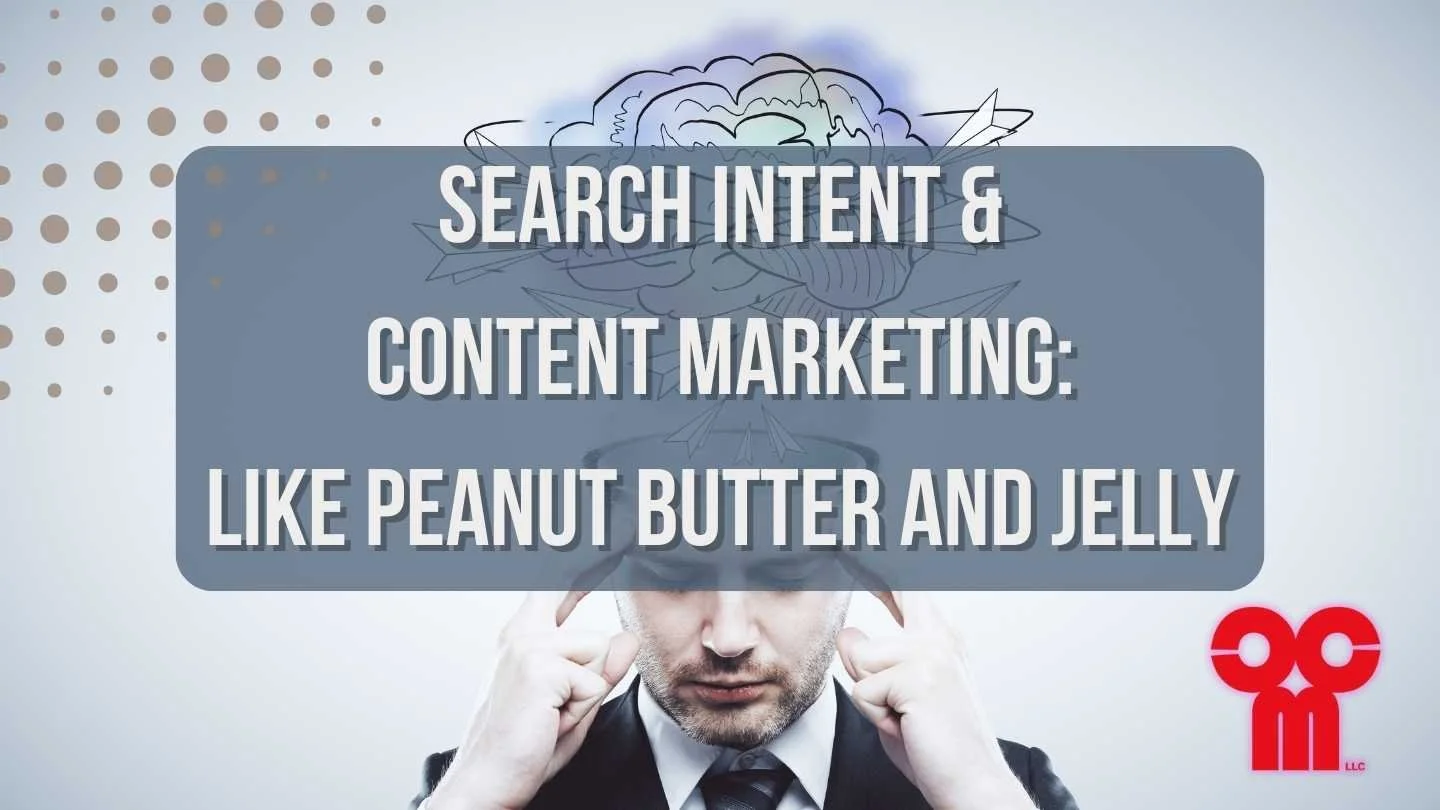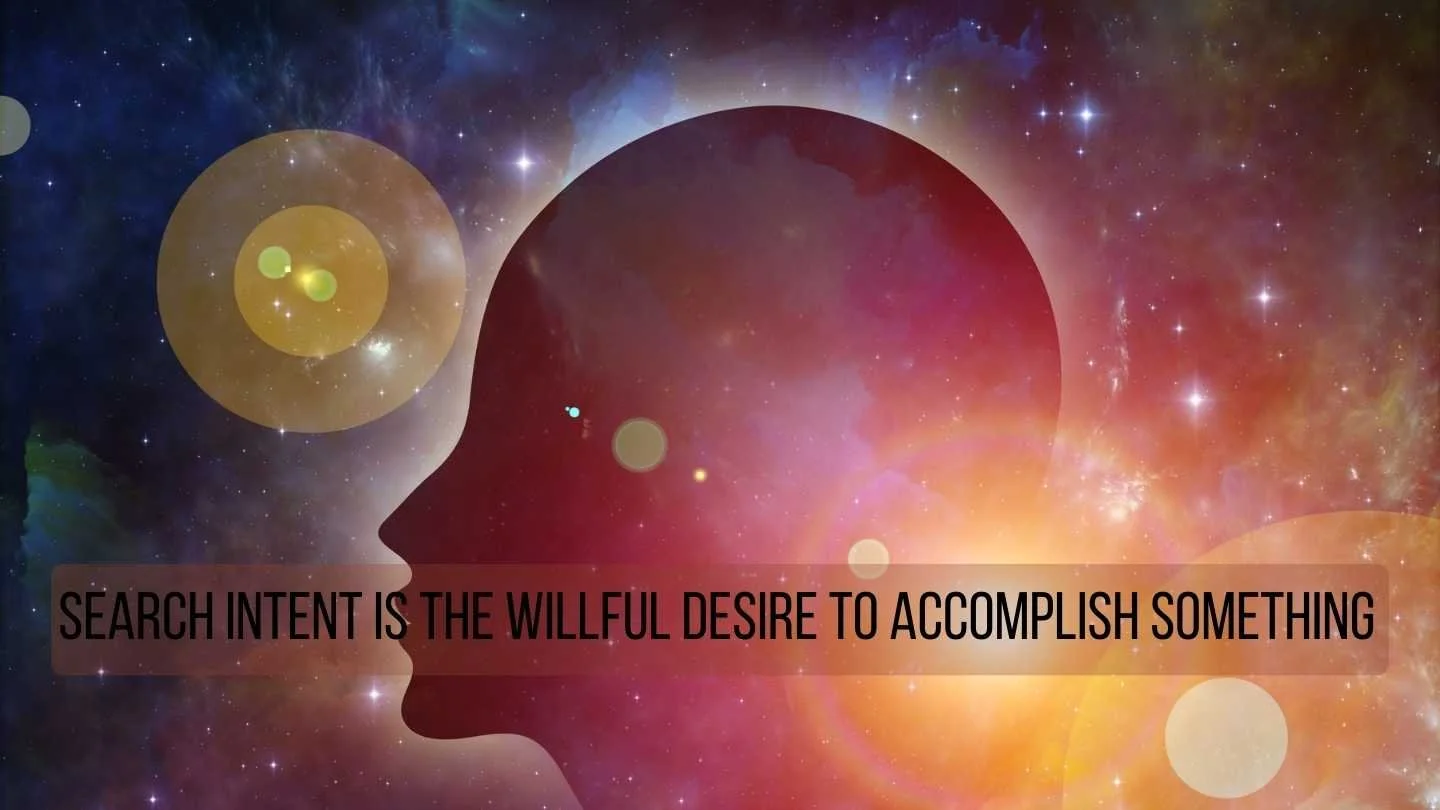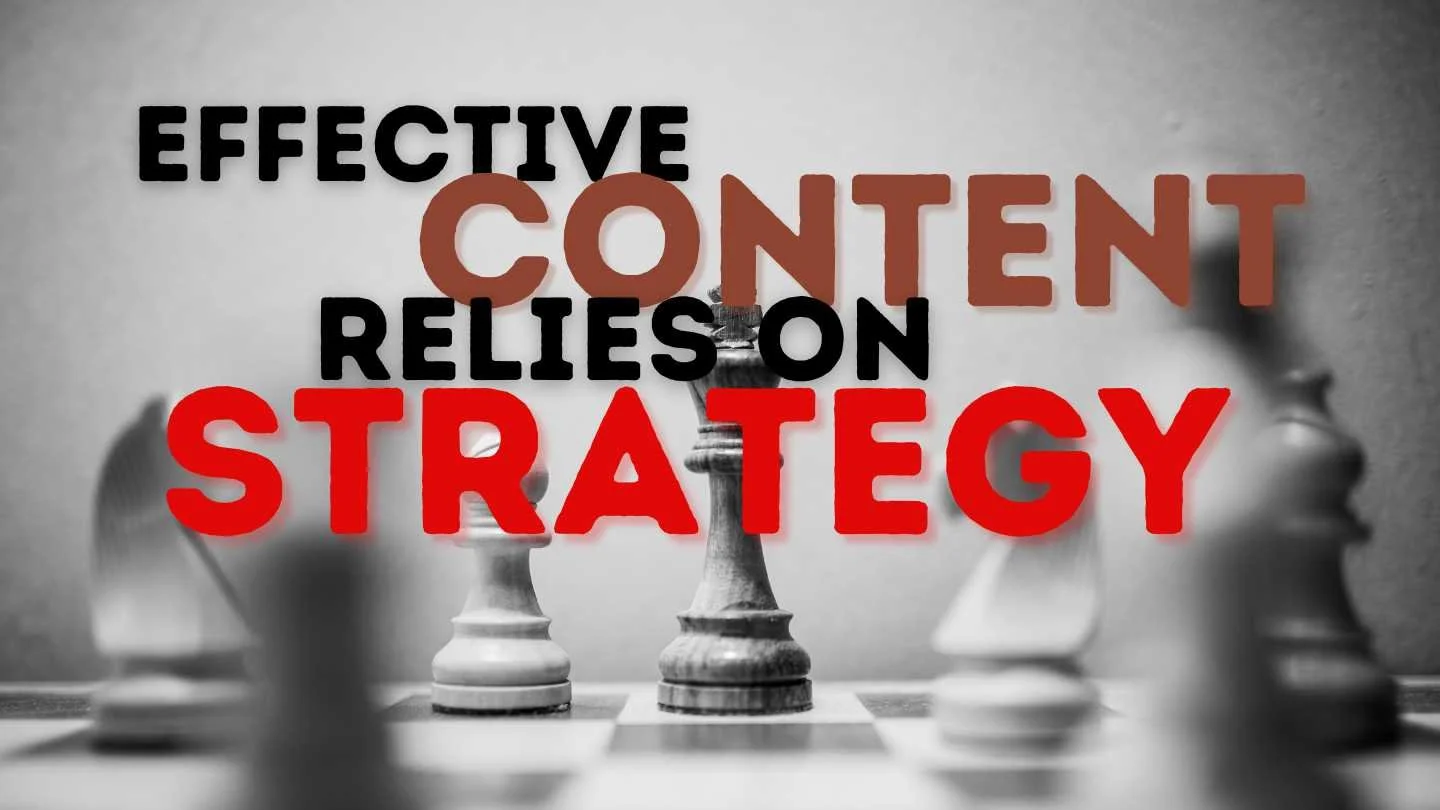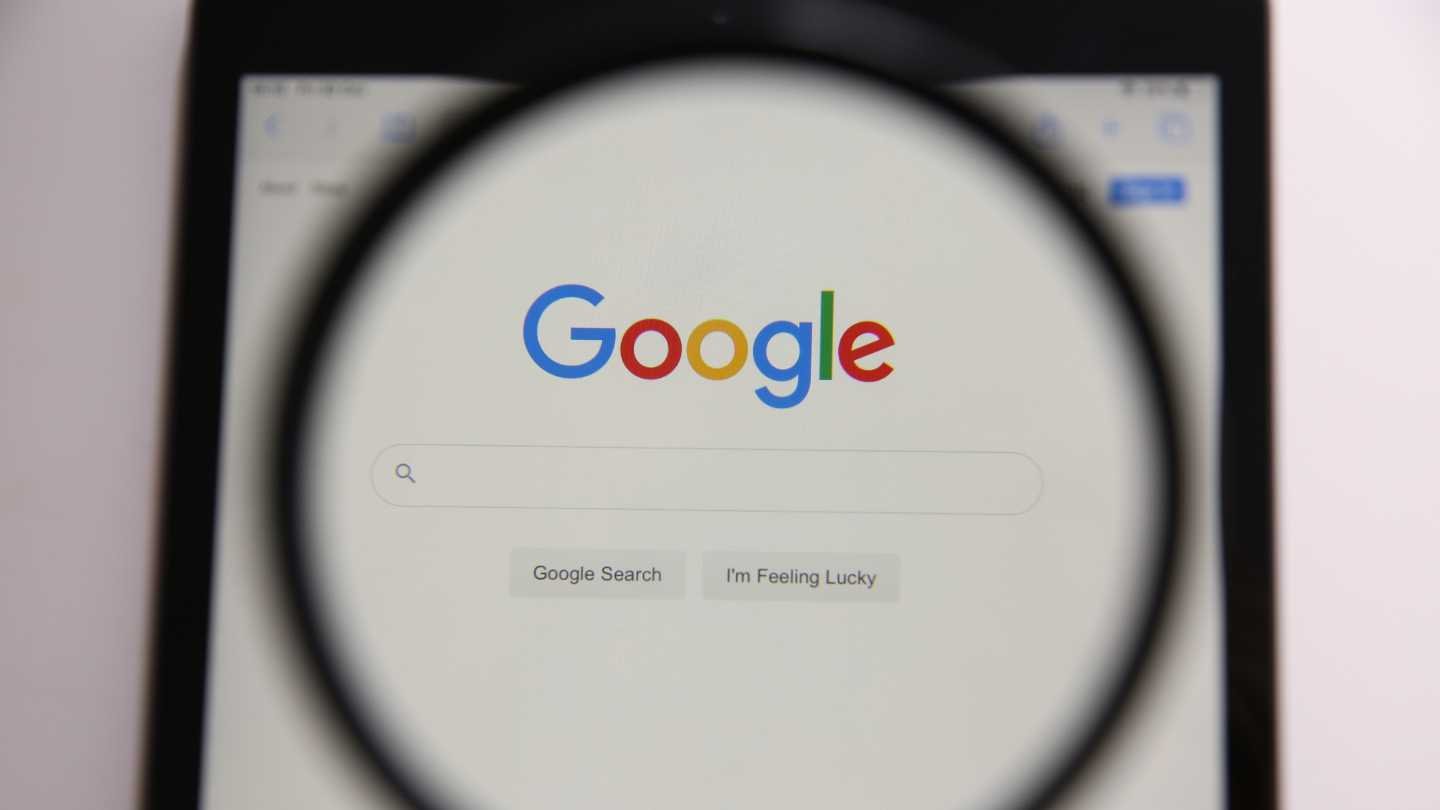Search Intent and Content Marketing: Like Peanut Butter and Jelly
Search intent plays a major role in content development & strategy, meaning it’s vital to master the concepts of search intent if you want to leverage its power.
When I first started out in content marketing in 2011 (we used to ride dinosaurs back then and had these weird devices called iPods), the goal of SEO in content development was to get the right keywords on the screen with enough content to make a web page look less-than blank. That’s about it.
The user experience often took a back seat when developing content because the goal wasn’t always to develop content that people would consume. Instead, the goal was to tell search engines what they wanted to hear (read) to get ranked higher in search results pages.
The Role of Search Intent: Then and Now
Search intent, meaning the reason for someone choosing specific keywords when searching for something on the web, didn’t factor into things. Well, ok, let me take that back – Search intent “did” factor into things, but not in the ways in which it does today.
In the modern era of search, where we no longer ride dinosaurs or use iPods, search intent has become increasingly important. Modern search engines actually “read” and “understand” content on the Internet, and the SEO tactics of yore are no longer effective.
So-called “black hat SEO” is still practiced, but it never pays off in the long run. Most of these strategies are outdated, and they don’t lead to long-term success with content marketing.
Don’t Be That Guy
In fact, if you were to try these same tactics today, and believe me—people still try—you’re going to be lucky if your website even gets indexed by Google, let alone ranks for any keywords.
The good news it that you don’t have to be one of those people. With a solid understanding of:
Search intent
How search engines view search intent
How you can apply search intent concepts to your content marketing strategy
You can develop a content marketing strategy that meets potential customers where they are along the buyer journey and guides them to where you want them to be – your product and service pages!
What You’ll Learn in This Post
Below, we’re going to take a look at:
What search intent is
How search intent affects your SEO efforts
Why search intent matters in content marketing
How we use search intent to craft the right content
By the end, you’ll have a better understanding of how search engines work, what they look for when determining rank, and what you can do to get found for the right search terms online.
When someone searches on the web, they have a willful desire to accomplish a goal. The job of content marketing is to meet that desire with content that matches intention.
A Closer Look at Search Intent
You can use search intent to make your content stand out and get found online by thinking about the nature of your content and what how it relates to why people search for things on the web.
The intent of someone searching on the web is the purpose they have for seeking something out in a particular way.
Intent in User Behavior
Intention is the willful desire to accomplish something. Online, this can take many forms, but we have intentions in everyday life.
You’re hungry, so you intend to get something to eat. You’re tired, so you intend to get some sleep. You need or want a new product, so you intend to find it and purchase it.
Matching search intent is like meeting customers halfway
This is fairly straightforward stuff that you likely don’t even think about each day, but intention is always there. At Charlotte Content Marketing, our job as digital marketers is to think about how intent when searching for things matches the content we develop.
We also need to think about how we can use search intent to create content that leads a potential customer from one place to the next.
What is Search Intent?
Search intent, also sometimes referred to as user intent, is a phrase used to define the what and why of someone’s online search. When we examine search intent, we are looking for answers to questions like:
What is the person searching for?
Why are they searching for this specific thing?
How do the words used in a search tell us about the intent of the search?
Another way to look at search intent is that it defines your will to do something. When you intend to do something, you have a plan in your mind.
The goal of content marketing & SEO is to match the content presented with the intent & goals of the user.
This plan may not be fleshed out, but, as mentioned above, you have a willful purpose in mind for taking certain steps to achieve an action. You are not blindly doing something.
You have a willful purpose behind what, why, and how you do things.
What Are the Four Types of Search Intent?
To break down this purposeful will when searching the web, you need to know that there are four types of search intent, and each one is used to look for different types of pages and data.
The lines can blur when it comes to search intent since intention can take on differing levels of intensity in different ways at the same time.
An Example of How Multiple Forms of Intent Can Coexist
For example, you may be interested in hiring a content marketing agency to develop website content for your business. You can search for a directory of content marketing agencies, and in doing so, you are trying to get more information about a topic while trying to find a specific type of page on the web, all while also having your mind set on possibly engaging in a financial transaction with an agency.
Informational search intent is concerned with seeking out information, not conducting a transaction
Let’s take a look at the four main types of search intent to learn how they will eventually affect our content development decisions:
Informational Search Intent
Informational search intent describes the intention of a search engine user to find information only. They may be interested in purchasing something, but that is not the intention of their search.
Examples of informational search intent include:
Where is the Statue of Liberty located?
How do I get rid of a cold?
What time does the mall open?
Once again, someone searching for terms that have an informational intent may actually plan to make a purchase, but they aren’t searching for that specific purpose. For instance, someone searching for “Where is the Statue of Liberty located?” may plan to purchase tickets to tour the attraction. For now, however, they are simply looking for the location of the Statue of Liberty.
Navigational search intent is used to get someone to a specific place or page on the web
Navigational Search Intent
Navigational search intent describes the use of online search to look for specific pages or locations. Someone with navigational search intent is trying to navigate to a specific page or place online.
Examples of navigational search intent include:
Facebook login page
Comcast channel guide
Opera ticket office
With that last example, things get a bit tricky. Someone searching for an “opera ticket office” is likely searching for the page where tickets can be purchased for an upcoming opera performance at a local performing arts center.
In this way, the person is searching with the intent to buy something, but they want to find a specific place to purchase. The key here is “the specific place”. The person is not searching for just anywhere to buy tickets. Instead, they are searching for a specific page, even if they have commercial intent.
Commercial search intent is used when someone is interested in making a purchase
Commercial Search Intent
Commercial search intent involves searches that are for making a purchase decision. These searches are used by people who have decided that they are interested in a product or service or category of products and services, but they want to learn more.
Examples of commercial search intent can include:
Best Italian restaurant near me
Discount shoes
Used cars for sale
Search queries that contain commercial search intent are made by people who want to browse but are not looking specifically to make a purchase. Then again, they may want to make a purchase, but they may want more information.
The inclusion of keywords like “best” often means that the user intent is to find products and services to consider for purchase, but they are not looking specifically for places from which transactions can be conducted.
Transactional search intent is used when someone is ready to make a purchase
Transactional Search Intent
Lastly, we have transactional search intent. These are user searches where someone is interested in completing a sale. They have moved beyond the consideration stage and are ready to buy.
Examples of transactional search intent can include:
Buy pool supplies
Where to purchase a new printer
Clothing store with free shipping
As mentioned above, there is some overlap when it comes to search intent and our four categories. Search intent is one part user behavior, one part psychology, and one part data.
There aren’t always hard-and-fast rules with search intent, but it pays to understand these four main categories since they will help us craft a content strategy that reaches our target audience along the buyer journey.
We want the right links pointing to the right content when matching search intent
How Do We Use Search Intent in Content Marketing?
Although we can identify search intent (for the most part), we need to know how it factors into our content decisions in order to leverage this knowledge.
To do this, we can consider the types of content that work best with each type of search intent, or rather, how we can match these user types to make sure our landing pages get in front of them for each type of search.
For transactional content, for example, we want searches to lead to product pages. For informational search intent, we might want searches to lead to blog posts about a broad topic that involves your brand’s products and services as solutions to the challenges presented in the post.
If you aren’t matching your content to search intent, you may end up wasting time & opportunities
We Don’t Want to Waste Opportunities
What we don’t want is to waste opportunities by designing content that doesn’t match search intent. For instance, if we optimize a product page with a bunch of information about the benefits of a product category, this page may come up in searches by people who just want information.
While it’s great that we get the product page in front of the user, they haven’t signaled that they are ready to buy. They just want to learn about a product or service category.
Providing the wrong content for a specific search can overwhelm potential customers & cause them to bounce
Don’t Overwhelm Users - Lead Them Instead
The product page may be overwhelming since they don’t even know what they’re looking for, why they need a product or service, or whether they even want a product or service. In this case, we haven’t satisfied the user intent and may lose engagement.
Think about it like this: Suppose you wanted to buy a new car, but you had no specific make or model in mind. You search for something like, “Guide for buying a new car” on the web.
Your content should be used to lead users from one type of content to another along the buyer journey
If the first result you clicked on was a purchase page for a new Mercedes, you’re probably not going to get your wallet out. Instead, you’re going to go back to searching.
The transaction page did not satisfy the intent of your search. While Mercedes may be just what you wanted in the end, that wasn’t the intention of your search.
Thinking About How People Search & the Buyer Journey
I recently had a conversation with a client of Charlotte Content Marketing regarding this very topic.
We were discussing podcasts and search results and were trying to figure out the best way to add a podcast on various web properties to get found for search terms on the web while also getting found on podcast directories.
When matching content to search intent, you need to think about the psychology behind why people search the way they do.
In my research, people don’t search for podcasts using Google and other search engines. I mean, sure, they do sometimes, but for the most part, people look for podcasts on a podcast site or directory. Even then, unless someone is seeking out a specific podcast, they will only search for topics, not exact-match, branded keywords.
In the case of this client, we decided to focus on including our keywords in the show and episode descriptions rather than worrying as much about the title. We also decided to create a dedicated podcast show page on the brand’s website where new episodes will be linked.
You need to think about content strategy to not only match search intent but also to move a potential customer to the next step in the buyer journey
Additionally, we agreed to create a new blog post each time a new episode was uploaded. All of this was done with user behavior and search intent in mind.
Our show and episode description content is designed to surface the podcast in traditional search engine results and on podcast platforms
The blog post for each episode adds value to the site, provides updated, branded content for the site
The addition of a dedicated podcast page provides more opportunities for informational search intent based on the description of the show and brand
Using this strategy, we cover multiple bases and can capture more traffic for the podcast as well as the brand’s website.
User experience should be paramount when thinking about search intent and how your content matches it
It’s All About the User Experience
To bring things full circle, let’s go back to something I mentioned at the beginning of this post: User experience. You need to satisfy the search intent with your content, but user experience plays a key role in this.
For example, if you create a page on your brand’s site that provides information about a product category, this may come up on a search engine result page for an informational search.
You then want to make sure you have content on a linked page that satisfies commercial search intent. Why?
Because we want the informational content to provide such value that it causes the user to click through to the commercial content. Ultimately, the goal is to then entice the user to click through to the transactional content where they will make a purchase.
Google determines what content matches search intent, so content must conform to SEO best practices as well
Google (Sometimes) Makes the Call
It’s also worth noting that Google makes the final call in some cases. Google’s main goal is to provide a good search experience so that you will use its search engine and associated products daily.
When you do this, you see ads. Google gets paid for ads. Therefore, Google has a vested interest in making its search results the best possible.
If Google isn’t bringing up results that match a user’s search intent, people won’t use it, and Google won’t make money. What this means for your SEO strategy is that, despite your best efforts, you can’t fit a square peg into a round hole.
If Google determines a page does not match user intent, it isn’t going to serve that page. You may see some success early on in your SEO strategy by stuffing keywords and phrases into a page in the hopes of trying to get it to rank for all kinds of searches, but at the end of the day, if Google says no, you may have to change your content strategy.
Contact the Experts at Charlotte Content Marketing to Learn More About Leveraging Search Intent for Your Brand
At Charlotte Content Marketing, our agency is dedicated to developing content and content strategies that factor in all available opportunities. We evaluate search intent along with a variety of other factors to ensure our clients get the most impact from their content marketing efforts in the Charlotte, NC, region.
To learn more about how our team can help, schedule a no-obligation consultation. Let’s have a chat about your goals and see where Charlotte Content Marketing can help you achieve them. Call us at (704) 323-6762, or schedule online right now using our convenient contact form.

















